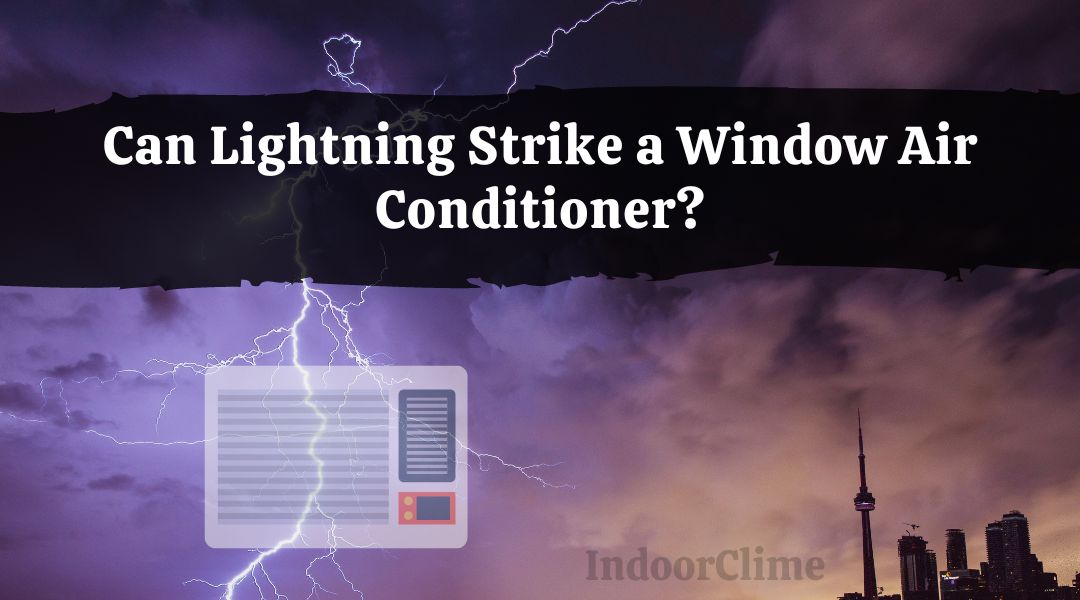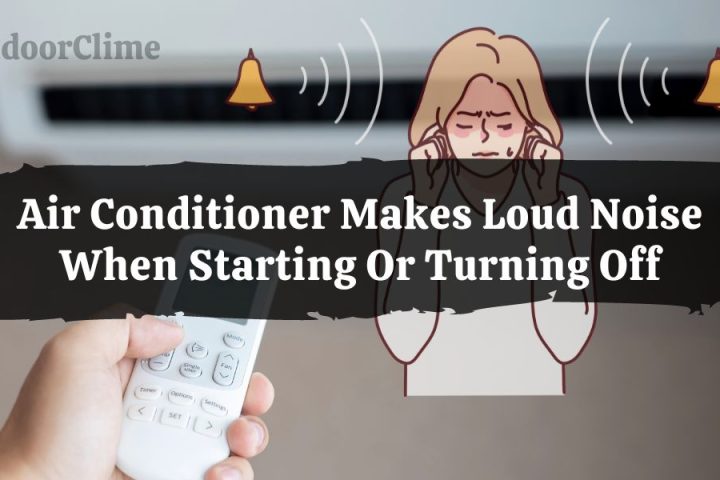A common concern every household have, especially during a thunderstorm, is the possibility of lightning striking their window air conditioner unit. Since unmounting them during such events is impractical, many believed that turning them off would solve the problem.
But again, can lightning strike a window air conditioner?
Yes, there’s a possibility that lightning can strike a window air conditioner, particularly if you’re living in a high-rise building.
However, it is only a possibility and very unlikely to occur. Generally, installing further up the ground and leaving the AC unit running during thunderstorms is still safe.
If you want to know more about the matter and protect your unit from a lightning strike, then the article I’ve prepared for today is specially written to put your mind at ease.
Can Lightning Strike a Window Air Conditioner?
A thunderstorm can still happen occasionally in the peak of summer days. Thus, many prefer leaving them on to ease the effects of high temperatures.
However, many people’s concern about the instance is that lightning damages the AC unit considering that its back section is fully exposed outside.
As discussed earlier, the chance of lightning striking your window air conditioning unit is possible. However, it is a rare occurrence, according to several studies.
Let your AC unit run and remain plugged in during a storm is safe.
However, the risk could increase, especially if the unit is in the upper section of a building or high-rise apartment and mounted further up the ground.
What Happens If Lightning Strikes an Air Conditioner?
If a lightning strike happens, you have to note that most electronic appliances today are insulated to withstand the strong electric surge of lightning.
Also, their components are nonflammable, which means you were not in danger of an explosion when it short-circuited.
What can happen is that the strong currents will dissolve the unit’s power port and the plugs connecting it to the power line. And then, the electric surge can significantly affect the internal components, which may lead to permanent damage.
The average repair cost can range from $300 to $600. However, there are no guarantees that the unit will be fixed and working in tip-top conditions.
It would be more practical to purchase a brand new one in this scenario instead of spending money on repairs.
Is it Ok to Run Your Air Conditioner During a Thunderstorm?

Lightning afflicting the window air conditioner is highly unlikely. With this being said—it is still safe to allow your unit to run even during a thunderstorm and enjoy the convenience of cooling down if the weather is too hot.
The air conditioner’s coils extract moisture and lower humidity when it comes to contact with rainwater, which improves the comfort level indoors.
However, as explained earlier, the event is possible from happening that can cause you to incur huge expenses on repairs or purchasing a new unit if it’s irreparable.
Since removing and mounting them back again is highly inconvenient and time-consuming due to their apparent size, you can observe two straightforward preventive measures to prevent lightning from damaging your unit and help you save money.
First and foremost, you have to turn off your air conditioner. And then, you will need to unplug them.
So why do you need to turn them off during a thunderstorm? Let’s move on to the next section and find out.
Why is it Important to Turn Off Your Air Conditioner During a Thunderstorm?
Other methods to protect your window air conditioning unit and other home electronic appliances are installing lightning rods, ground rounds, and lightning conductors to redirect the strike to the ground instead.
However, these home installations can be expensive for initial and maintenance costs. In addition, they still do not guarantee protection from lightning strikes.
Again, the simplest method to limit the risk is to turn off the air conditioner. It will still damage the unit but minimize further damage to your electrical system and other appliances.
Each lightning bolt generates a surge of approximately five billion joules. The strong and sudden lightning strike will travel through your home electrical system before your breaker is activated.
The potential damage could increase, especially if the air conditioner runs as if it has been hit by lightning.
How Do I Protect My Air Conditioner from Lightning?
In addition, turning off your window air conditioner unit and unplugging it to protect it from a lightning strike is as follows.
Cover the Air Conditioner

While it’s unlikely that you would dismount the air conditioner during a thunderstorm, you can always cover the unit with a tarp to minimize the risk of lightning.
Although it won’t be enough to shield the powerful joules of energy, it can still provide some protection since the tarps are a good heat insulator.
You can get a window air conditioner cover on Amazon
In addition, it can protect your unit from water and falling debris during a storm that can damage your air conditioner.
Unit Inspection
After the thunderstorm, check your unit for damages before plugging it in and turning it on. Also, check the air conditioner for water damage or debris that may have been stuck in the unit.
Perform necessary measures like removing the debris and drying them before using it. And the reason why this is the case is that these elements can have a significant impact that could short-circuit the unit.
Can I Use My AC in a Rain Storm?
Your window air conditioning unit is completely safe in a rainstorm. The unit’s casing is usually waterproof and should not cause any harm.
Drops of rainwater can help improve the comfort level indoors. The coils of the AC unit extract the moisture that lowers the humidity and improves the airflow inside your home.






